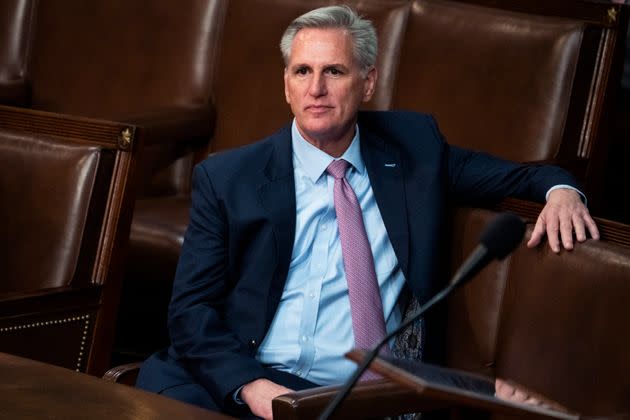It’s Been 2 Years Since The Capitol Riot. Democracy Is Still Crumbling.
- Oops!Something went wrong.Please try again later.
This article is part of HuffPost’s biweekly politics newsletter. Click here to subscribe.
It’s hard to think of a more poignant split screen, or one that revealed more about this moment in American politics, than the one that appeared on Friday afternoon.
On one side, from the White House, was a ceremony honoring heroes who two years ago fought former President Donald Trump’s coup attempt ― at the ballot box, during the vote count and, finally, with the Jan. 6 assault on Capitol Hill.
Among those receiving the Presidential Citizens Medal were Michael Fanone, Eugene Goodman and Caroline Edwards, three former officers who defended the Capitol building from Trump-supporting insurrectionists. Also at the ceremony were Ruby Freeman and Shaye Moss, the mother and daughter election workers from Atlanta whom Trump singled out in his remarks ― and who faced death threats afterwards.
HuffPost’s S.V. Date has the full story, including some of the remarks by President Joe Biden.
“History will remember your names,” Biden said, addressing the award winners, along with the families of three officers who died after the insurrection and are receiving the medal posthumously. “What you did was truly consequential.”
The other half of the split screen was from the other end of Pennsylvania Avenue, on Capitol Hill, where the House was in the middle of its 13th vote on the next speaker and California Republican Kevin McCarthy still had not locked up the votes he needed.
By now, you’re probably familiar with the backstory to this drama: It takes a majority of voting members of the House to become speaker. Because Republicans control the chamber by the thinnest of margins, and because Democrats aren’t going to vote for a Republican, the GOP caucus needs near unanimity to pick a leader.

Republican Leader Kevin McCarthy (Calif.) is seen on the House floor after a vote in which he did not receive enough votes for Speaker of House on Friday, Jan. 6.
In normal times, this wouldn’t be too difficult a task, which is why it’s been more than 100 years since a speaker’s vote went through multiple ballots. But these are not normal times, and this past week, over and over again, McCarthy fell short because a small group of extremist Republicans kept voting no.
McCarthy finally seemed to make some headway on Friday afternoon, when about a dozen of the “no” votes flipped to “yes,” leaving him just two or three or four short of what he ultimately needs, depending on how many members total continue to participate in future votes. (The requirement is for a majority of voting members, so if some members are absent or simply vote “present,” then the threshold for winning comes down.)
As the House broke for adjournment until 10 p.m. Friday, and with some McCarthy supporters set to return from travel, it looked like he might finally be on track to win, if not on Friday then sometime over the weekend ― and quite possibly by the time you are reading this. (HuffPost’s Capitol Hill team has been covering this story, minute by minute, and you can find the latest on our homepage.)
But if McCarthy does finally prevail, the real story will be the concessions he made to the extremists in order to get their support.
One in particular stands out: an agreement to allow the congressional equivalent of a no-confidence vote, any time a single member requests one. That will make it difficult for McCarthy to defy even a small group of Republicans, which sets up a potential crisis when the U.S. reaches its borrowing limit later this year. If Congress doesn’t vote to raise the “debt ceiling” ― that is, to authorize more borrowing ― it will default on its bills, possibly creating a financial crisis not just here but abroad as well.
Most countries don’t require votes to increase borrowing authority, and in this country it wasn’t typically a major controversy until the presidency of Barack Obama, when Republicans started using the debt ceiling votes as leverage to demand policy changes ― namely, big cuts to federal programs ― that they couldn’t enact on their own.
They succeeded, in part, winning some spending concessions. But some Republicans wanted even more dramatic cuts; then-Speaker John Boehner, they believed, cut deals too quickly and with too many concessions. The House Republicans voting against McCarthy this week worried he would do the same thing, which is one reason why they were determined to limit his power ― as, apparently, he’s agreed to let them do.
You might be wondering why this group of extremist Republicans has so much more leverage over party leaders than the extremist Republicans of the Boehner era, which after all was just a few years ago. And there’s no single, simple answer.
But part of the explanation is a change in the incentive structure on Capitol Hill. Until relatively recently, members had incentives to follow their leaders because, if they didn’t, they wouldn’t get the committee assignments ― or concessions in legislation ― they needed to produce benefits for their constituents and supporters. That made it harder to raise money and generate support and, ultimately, to win reelection.

Rep. Matt Gaetz (R-Fla.) delivers remarks in the House Chamber during the fourth day of elections for speaker of the House at the U.S. Capitol Building on Jan. 6.
Nowadays, elected officials can win support and collect donations simply by making a name for themselves in traditional and social media, which reward rhetoric more than results. And while that’s true for both parties, the effects are especially strong for Republicans because of the insular dynamics of right-wing politics.
“You’re getting people who are coming in believing that this is the way to vault to stardom,” Norm Ornstein, the political scientist and scholar emeritus at the American Enterprise Institute, told HuffPost. “And vaulting to stardom means you’re going to be showcased at CPAC. It means you’re going to be able to become a national figure, by appearing regularly on ‘Tucker Carlson.’ And it means you’re going to be able to get a lot of money coming in.”
Another part of the explanation may be a broader change in the Republican Party as a whole ― in particular, the arrival of a younger generation who grew up hearing from their leaders that Democrats were socialist and fundamentally anti-American, and think extreme measures like crashing America’s credit rating in worldwide markets is a worthwhile, even necessary response.
“If in fact their ideology and the rhetoric that they’ve used all these years is right ― it’s not right, but if it were ― then the only truly only truly good position to take is that we’ve got to shut everything down,” Heather Cox Richardson, the Boston College historian and author of a widely read Substack, told HuffPost.
Most Americans do not subscribe to these views, of course. But House Republicans are pushing ahead anyway. With their votes against McCarthy and the concessions they’ve already won, they are giving themselves a chance to impose their will anyway ― which, of course, is precisely what the insurrectionists were trying to do on January 6, when they tried to make Trump president even after he lost the election.
That was an act of political violence. This week’s votes were an act of political extortion. They were not the same thing, obviously. But they weren’t so different either.
